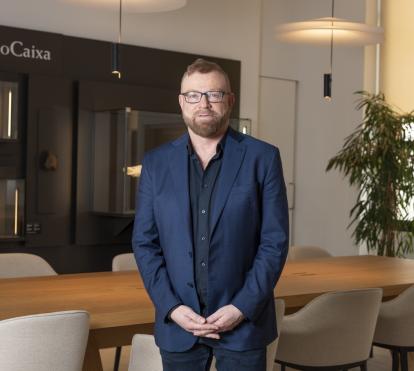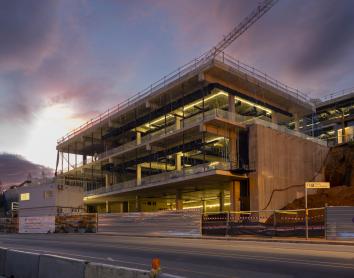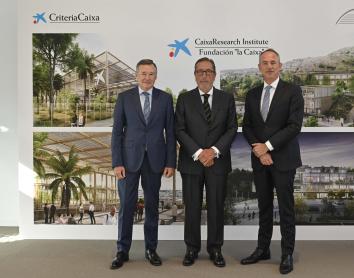
March 12, 2025
Barcelona18:30In personGabriel Rabinovich, group leader at the CaixaResearch Institute, delivers his first lecture in Spain
CosmoCaixa Science Museum | C/ Isaac Newton, 26
Add to my eventsThe Argentinian Doctor of Biochemistry, Gabriel Rabinovich, one of the first group leaders of the future CaixaResearch Institute, will give an informative lecture on 12 March at 6.30 p.m. at the CosmoCaixa Science Museum. The talk will focus on the discovery of new mechanisms of tumour escape and the regulation of the inflammatory response. His findings have opened up new therapeutic possibilities for cancer and autoimmune diseases.
This lecture at CosmoCaixa is the first public event in Spain by Dr Rabinovich since joining the CaixaResearch Institute, which is set to open at the end of this yearand is already forming its first research groups. The Barcelona centre will be entirely dedicated to immunology, the branch of science that helps us better understand the functioning of our immune system, the body’s first line of defence.
The CaixaResearch Institute will focus on generating knowledge and providing solutions for infectious diseases, global health, cancer and neurological disorders, among others, through the study of immunology.
In his lecture, “A sweet adventure from an unexpected discovery towards the design of new therapies”, Dr Rabinovich will talk about a highly conserved family of proteins throughout evolution –galectins– that promote mechanisms associated with tumour growth by allowing tumours to evade the immune system, create new blood vessels (a process known as angiogenesis) and migrate to form metastases. Galectin-1, a member of this family, binds to sugars present on the surface of certain immune system cells –key guardians of our body– and fine-tunes them to maintain our balance.
The doctor will explain the progress made over more than 30 years of research in this field, as well as the potential of galectins as new therapeutic targets against cancer and other diseases.
The lecture aligns with the CaixaResearch Institute’s mission to promote scientific outreach. This pioneering centre, the most emblematic project of the ”la Caixa” Foundation in the field of scientific research, not only aims to generate new knowledge but also to share it with society, fostering scientific vocations and making immunology more accessible.
A multi-award-winning researcher with a strong focus
on innovation
Dr Rabinovich, who is a senior researcher at the Institute of Biology and Experimental Medicine in Buenos Aires (IBYME, CONICET-FIBYME), will maintain this dual affiliation. His work there primarily focuses on translating fundamental research into innovative therapeutic strategies against cancer and autoimmune inflammation. To advance this goal, he founded the biotechnology company Galtec, where he also serves as scientific leader, developing treatments for colorectal cancer, multiple sclerosis and atherosclerosis. This translational approach –ensuring that research findings reach patients– will continue in his new role as a group leader at the CaixaResearch Institute.
Dr Rabinovich has published over 300 articles, many of them in high-impact journals such as Cell, Nature, Immunity, Cancer Cell, Nature Immunology, Nature Medicine, PNAS, Science Advances and the Journal of Experimental Medicine. He holds eight approved patents and serves as an associate editor and member of the editorial board of several scientific journals. He has received financial support from national and international agencies and has delivered over 400 lectures.
His work has been recognised with numerous awards, including the recent Hakomori Prize (International Glycoconjugate Organization) and the Karl Meyer Award (Society of Glycobiology) for the most outstanding glycobiologist, the TWAS Prize in Medical Sciences (Italy), the John Simon Guggenheim Fellowship (USA), the National Researcher Award (Argentina), the Bunge and Born Foundation Lifetime Achievement Award (Argentina), the Konex Brilliant Award (Argentina), the Mizutani Foundation for Glycoscience Award (Japan), the Cancer Research Institute Award (USA) and the Bernardo Houssay Award (Argentina), among others. He has also been named a member of the National Academy of Sciences (NAS), the Latin American Academy of Scoiences (ACAL) and the European Molecular Biology Organization (EMBO), among others.
A magnet attracting top talent
The CaixaResearch Institute –whose Board of Trustees is chaired by Isidro Fainé, chairman of the ”la Caixa” Foundation, with Javier Solana, chair of the organisation’s Scientific Committee, as a member– approved its 2025-2027 Kick-off Plan at the end of 2024. One of the key pillars of this plan is the generation of new scientific knowledge in disease immunology, for which it will rely on leading experts in the field.
As part of this plan, two key appointments have already been announced: Dr Rabinovich, and Dr Josep Dalmau, who will hold a dual position between his current institute, IDIBAPS-Clínic, and the CaixaResearch Institute. There are also links between the Institute and the oncologist Josep Tabernero, director of the VHIO, who chairs the internal Scientific Committee, and Antoni Ribas, director of the Parker Institute for Cancer Immunotherapy and the Tumor Immunology Program at the Jonsson Comprehensive Cancer Center, University of California, Los Angeles (UCLA), who now also serves as chair of the CaixaResearch Institute’s Scientific Advisory Board.
Throughout 2025, the recruitment of additional principal investigators will be announced. By the end of 2027, the Institute will host 12 research groups, and when operating at full capacity in 2033 will have more than 40 research groups alongside scientific-technical service units.
Other objectives of the Institute, in which the ”la Caixa” Foundation will invest some 100 million euros, include fostering a culture of innovation that translates into new treatments and health-related products, implementing cutting-edge technologies, and establishing a flexible and efficient organisational model based on talent management.
The Institute, located opposite the CosmoCaixa Science Museum, will begin work on fitting out the laboratories in the coming months. The first of the two CaixaResearch Institute buildings is expected to be inaugurated by the end of this year.


